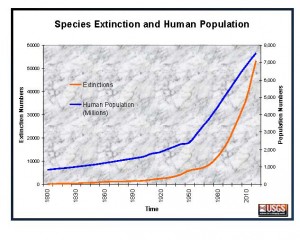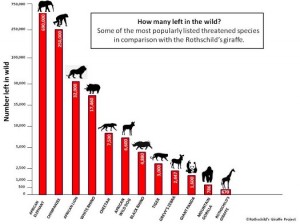Gone in a Blink of an Eye?
Jun 2nd, 2014 | By admin | Category: Biodiversity/ConservationBy Suzanne York, www.howmany.org
There is no denying that humans are impacting the planet, and not necessarily for the good. Some people may argue this point, but one look at mountaintops blown off in Appalachia or forests cleared for palm oil production would have to elicit some acceptance of human alteration of the environment.Many scientists believe that Earth is about to face its sixth mass extinction (some think we are already in the midst of it). In a new study published in the journal Science, researchers found that human population growth, habitat loss and rising consumption has increased species extinctions by more than 1,000 times their natural rate. These are higher than previously estimated and likely still underestimated.
Going, Going, Gone?
Species are now disappearing from Earth about 10 times faster than biologists had believed, said study lead author and noted biologist Stuart Pimm, a professor at Duke University who lead a team of nine international scientists.
Pimm told the Associated Pressthat “We are on the verge of the sixth great extinction. Whether we avoid it or not will depend on our actions.”He and co-author Clinton Jenkins of the Institute of Ecological Research in Brazil said there are numerous factors combining to make species disappear much faster than before. But the main issue is habitat loss – species are finding less land to live on as more places are built up and altered by humans.
Add to that invasive species crowding out native species, climate change affecting where species can survive, and overfishing, Pimm stated.
Pimm and Jenkins said there is hope. Both noted the use of smartphones and applications such as iNaturalist will help people and biologists find species in trouble. Once biologists know where endangered species are they can try to save habitats and use captive breeding and other techniques to save the species, they said.
However, in the face of the global economic juggernaut that treats nature as property, and a planet filled with 7 billion people on rising to between 8 and 10 billion by 2050, it will be a struggle.
A quick glance at the IUCN Red List of Threatened Species pulls up a vast number of creatures that most people have probably never heard of, much less seen. But there are, sadly, many “big name” species on the verge of extinction that should get the world’s attention. Imagine a world without these creatures below; the number represents how many are left in the wild:
Amur Leopard – 30
Javan Rhino – 35
Mountain Gorilla – 880
Giant Panda – 1,600
Bengal Tiger – 2,500)
Sumatran orangutan – 7,300
Silence the Chainsaws
But there might be hope, as the researchers believe. One innovative social entrepreneur founded Rainforest Connection, which turns recycled cell-phones into autonomous, solar-powered listening devices that can monitor and pinpoint chainsaw activity at great distance. The organization thinks this is a gamer changer, as it provides the world’s first real-time logging detection system, pinpointing deforestation activity as it occurs, and providing the data openly, freely, and immediately to anyone around the world.
For the first time on a scalable level, responsible agents can arrive on the scene in time to interrupt the perpetrators and stop the damage. Watch the short video of how it works:
It also puts to use the 150 million phones discarded in the United States alone. Stopping logging and recycling old cell phones seems like a win-win that just might help some of the world’s most endangered species. For the moment, it’s a wait-and-see situation, but the promise is there, which is better than just watching animals die off right before the eyes of the world.
Suzanne York is a senior writer with the Institute for Population Studies.




